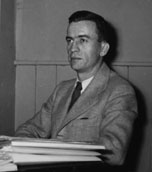Distinguished Faculty AwardBENJAMIN P. ATKINSON, L.H.D. '86

BENJAMIN P. ATKINSON, L.H.D. '86
Professor of English 1947-1982
Fifth Dean of Hobart College 1959-1962
Friday, September 22, 2000
Benjamin Peter Atkinson, the fifth Dean of Hobart College, was born in Cynthiana, Kentucky, on April 8, 1917. He attended Warren G. Harding high school in Warren, Ohio, and was elected to Phi Beta Kappa at Amherst College, from where he graduated magna cum laude in 1938. He continued his studies at Syracuse University, receiving his Master of Arts in 1941. He remained at Syracuse for six years as an instructor in English, until beginning his 35-year career at the Colleges in 1947.
Elevated to assistant professor in 1950 and full professor in 1962, he succeeded Walter Durfee in 1959 as Dean of Hobart College until 1962, when he stepped down to resume full-time teaching until his retirement in 1982.
Professor Atkinson was the co-editor of the definitive anthology, Literature For Our Time, long a part of the HWS curriculum, and in 1954-55 he taught at Columbia University under a special grant from the Carnegie Foundation.
His interest in language and literature led to courses in Chaucer, Victorian and modern poetry, linguistics, and the history of the English language, and no one of his generation was more respected as a teacher of writing.
Atkinson’s wife, Rosalie Dietert Atkinson, herself a much beloved member of the HWS community, also held a master’s degree from Syracuse and was Hobart’s librarian. The Atkinsons lived on Washington Street with their three daughters, in a large home which alumni and alumnae of three decades remember as a revolving-door salon, open at all hours. Roger Farrand ’49, student and eventual colleague of Atkinson, recalls the house as the place where T.S. Eliot’s The Wasteland was read aloud, where the new-fangled wire recorder was introduced to Geneva, where “we were beginning to dig Kerouac...far out for 1949.”
Douglas and Jane Anderson Jones, both of the Classes of 1970, remember that in 1968 Atkinson regularly quoted Beatles lyrics in class. “He was a kind and gentle mentor...with a wicked, dry wit” says Jane.
The Rev. R. Benjamin Moss ’52 thanks Professor Atkinson “for the power to think and write grammatically, clearly, precisely, leanly; to be self-critical about style, word usage, internal resonance, logic in writing and speaking. He had a thorough knowledge of and an abiding affection for the language.”
For Leslie J. Stark ’59, “Ben Atkinson’s own example of both erudite scholarships and a real passion for the language and the literature inspired me. Ben epitomized distinguished teaching. He was my most valued adviser in everything I did, long after graduation, and--more than anyone else-- he instilled in me a respect and love for reading and for good writing.”
In a reminiscence published in The Pulteney St. Survey after Atkinson’s death in 1987, David Landrey ’58 said he has “known no person whose authority was so respected as Ben’s.” But beyond that, “he taught me about love and loyalty. Whenever I visited Geneva, his office, home and arms were always open.”
When he became a Hobart’s Dean in 1959, Atkinson observed, with characteristic humility: “I am aware that I follow in a line of great deans. They include William Pitt Durfee, Milton Turk, and Walter Hetherington Durfee. I doubt if I can live up to these men, but I will try.”
For the students and colleagues who were fortunate to be at Hobart during his tenure, Ben Atkinson more than surpassed his modest expectations. Awarded the honorary degree of Doctor of Humane Letters in 1986, the emeritus dean and professor of English was cited by President Carroll W. Brewster:
We honor you today on behalf of countless Hobart men who speak the name Dean Atkinson with blended overtones of trepidation and affection, remembering occasions when to be called to the Dean’s office was an experience both formidable and fortifying, when their lives were touched by the terrible sweet energy that can be transmitted across generations by one who believes that to expect goodness is to encourage it to flourish.
